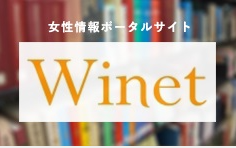Training/Events
- HOME
- Training/Events
Training/Events
- Domestic Training and Seminar
- Women’s Archives Center Exhibition
- Collaboration with Other Organizations
Domestic Training and Seminar
FY2024 Training Course to Promote Gender Equality for Leaders
-
Date / Location
May 15 to June 17, 2024 / Online
-
Co-host (partly)
The National Council of Women's Centers
-
Participants
leaders, managers, and directors from women's facilities, local governments, and groups
-
Number of Participants
382
-
Theme
Women's participation in decision-making in communities
-
Purpose
To deepen knowledge of gender equality and to develop practical skills for leading the promotion of gender equality in regions.
Contents
This training course delivered the latest information on gender equality, including that concerning national policies, international trends, and gender issues in the fields of politics and the economy as well as reports on cases of gender equality centers and studies conducted by NWEC.
In her keynote lecture, BANDO Kumiko, who worked in educational administration at the Ministry of Education, Culture, Sports, Science and Technology for many years and played many important roles, including Director-General of the Gender Equality Bureau, Cabinet Office, and Vice-Governor of Akita Prefecture, used statistical data to speak about the current status of gender equality in Japan and challenges. BANDO talked about how the Japanese government and other
domestic actors were responding to the issue of the country's shrinking population and the decline in the number of births; pointed out that this sense of crisis should be translated into transformations
aimed at achieving gender equality and empowerment of women and that speedy, strategic efforts should be made to this end; and expressed her expectation that administrative authorities and those
involved with gender equality centers would continue to support the development and initiatives of local female leaders.
The course received positive comments from participants, such as "It gave me an understanding of the latest information and the necessity of promoting gender equality now," and "I now grasp the current status of gender equality; sharing the same worries has given me ideas as well."
 Keynote lecture: "To realize women's participation in decision-making process"
Keynote lecture: "To realize women's participation in decision-making process"
 Lecturer: BANDO Kumiko
Lecturer: BANDO Kumiko
FY2024 Project Planning Training in Communities to Promote Gender Equality
-
Date / Location
(Online course) May 27 to June 28, 2024 / Online (Face-to-Face course) June 25 to June 26, 2024 / NWEC
-
Participants
workers in charge of project planning and operation at government offices, women's facilities, and community centers
-
Number of Participants
286 (including 24 participants in Face-to-Face course)
-
Purpose
To develop a deeper understanding of how to achieve consistency in planning, implementation, and evaluation of projects as well as the skills necessary for effectively organizing training and learning projects from a gender equality point of view.
Contents
This online course delivered lectures on perspectives and methods required for project planning—for example, gender statistics knowledge and information gathering methods necessary to identify challenges, keys to effective project planning, and how to create program designs (drafts of projects)—and introduced projects implemented by past course participants by making the most of what they had learned from this training program, and the results they had achieved after hard work and paying attention to processes.
The one-night two-day Face-to-Face course consisted of group work that focused on processes for creating program designs. Participants developed draft plans while receiving advice from advisors who had deep experience in planning projects at gender equality centers,and participants proactively exchanged opinions and shared their results. In addition, this course provided networking opportunities, including social gatherings.
 Closing session: "What abilities are required for project planning today?"
Closing session: "What abilities are required for project planning today?"
The course received positive comments from participants, such as "The online course helped me to learn about the idea of gender equality and priorities for city government employees; it taught me not only the basics but more practical knowledge that will be of help in actually planning projects at work, which I found worthwhile," and "The Face-to-Face course created a sense of closeness that I could not have felt on Zoom and made a difference in my attitude towards gender equality."
Gender Equality Training for Teachers and Staff
-
Date / Location
July 23 to September 24, 2024 / Online
-
Participants
directors and committee members of school boards, members of boards of education or education centers, school managers, and school staff
-
Number of Participants
555
-
Theme
Changing schools from the perspective of gender equality
-
Purpose
To identify the current status of and challenges to promoting gender equality in the field of school education, to develop a deeper understanding of the work styles of teachers and other school staff members, to accelerate the appointment of female managers and responses to diverse pupils and students, and to explore solutions to the aforementioned challenges according to organizations' present realities.
Contents
TERAMACHI Shinya (Practical Professor, Miyazaki Municipal University), a researcher specializing in gender and education, gave an evidence-based lecture on gender issues found in schools. He spoke not only about initiatives of the Ministry of Education, Culture, Sports, Science and Technology related to the acceleration of appointment of female managers and measures against child sexual abuse but also case studies on "wellbeing" and "gender equality education" in schools and the social circumstances surrounding children today (e.g., sexual diversity, LGBTQ, and online threats to children). In an information exchange session, participants were divided into four themed groups—namely, "Work-Life Balance for Teachers," "Supporting Women in Getting Promoted to Managerial Positions and Forming Their Careers," "Diverse Responses to Pupils and Students," and "The Coordination Required to Promote Gender Equality in Schools"—in which they exchanged opinions on the current realities of and initiatives in various regions.
 Lecture: "What perspective is necessary to promote gender equality in schools?"
Lecture: "What perspective is necessary to promote gender equality in schools?"
 Lecturer: TERAMACHI Shinya
Lecturer: TERAMACHI Shinya
The course received positive comments from participants, such as "I have come to realize how much I and my organization were bound by unconscious biases," and "It gave me an opportunity to stop and reflect, causing me to realize things I must keep in mind as a teacher."
Training Course for Counselors and Managers at Women's Centers
-
Date / Location
(Online course) August 27 to September 30, 2024 / Online (Face-to-Face course) September 19 to September 20, 2024 / NWEC
-
Participants
counselors and staff members in charge of counseling service at women's centers, and workers in charge of counseling service at local governments
-
Number of Participants
684 (including 49 participants in Face-to-Face course)
-
Purpose
To develop the knowledge and skills required to provide consultation services at women's centers and other facilities, and to learn related management and operating methods
Contents
This online course consisted of seven different lectures, including those on basic gender perspectives for understanding those who consult; response skills; how to create, manage, andoperate counseling rooms that are safe and secure for everyone; and trends in new legal amendments, such as recipient-centric support systems, joint custody, and other changes observed after the enforcement of the Act on Support for Women Facing Difficulties. In addition, information exchange sessions were held in which participants discussed the challenges they face in daily work operations with peer participants and advisors, and they shared their ideas about solutions.
In the one-night two-day Face-to-Face course, participants exchanged opinions on new support systems based on the Act on Support for Women Facing Difficulties through panel talks andgroup work, thereby learning about support policies suitable for their respective regions. The primary advantage of the Face-to-Face course was that participants could proactively communicate with one another through social gatherings and other occasions outside the training as well in order to build networks of personal contacts engaged in support for women in different parts of Japan.
 Lectures and group work: "What does a recipient-centric support system require?"
Lectures and group work: "What does a recipient-centric support system require?"
The course received positive comments from participants such as "I came to realize unconscious gender biases in myself," "The lectures included role-playing and were practical and easyto-understand; I am glad they taught me how to respond to different situations," and "I spoke about many different things with other participants I had just met as if we had known each other for a long time, which gave me courage."
"It's a shame not to know about it! Summer Seminar on How to Research Gender-Related Information"
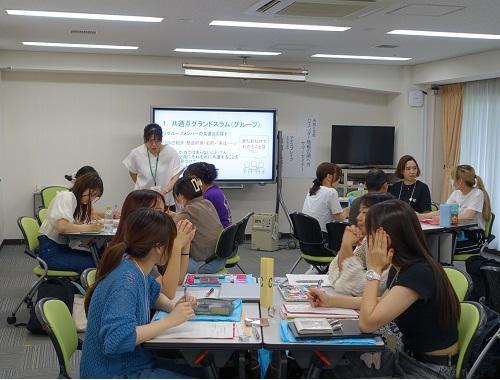
NWEC held a seminar titled "It’s shame not to know about it! Summer Seminar on How to Research Gender-Related Information" on August 28 to 29, 2024. The aim of this seminar was to provide younger generations with support for study and learning because they are expected to play a vital role in promoting gender equality. The seminar was designed to teach them how to do research and find documents when they write reports and theses on gender-related issues. In total, 16 university
students and graduate students participated in this seminar.
A lecture entitled "Methods for Writing Reports and Articles" helped participants to learn fundamental ideas about research, the characteristics of gender and feminism studies, how to organize their thoughts and set themes, how to collect and organize prior studies, how to do research, the basic structure of a table of contents, and other topics.
After study tours of the Information Center for Women's Education and the Women's Archives Center, participants who were still unsure about their own themes asked tutors for advice, while those who had already decided on their themes collected documents and information at the Information Center.
The dinner was followed by a social gathering in which they shared the documents and information they had collected with each other and exchanged opinions.
On the second day, participants continued to collect information and consulted the tutors. Each created a worksheet and gave a presentation.
The course received positive comments from participants, such as "The social gathering gave me an opportunity to speak to people pursuing themes similar to my own and to elucidate my own theme, and I was able to find documents I had never seen before in the Information Center," and "The program taught me how to conduct research on a theme of my interest, which is invaluable; it has motivated me to continue to study."
Training on Gender Responsive Approach to Disaster Management
-
Date / Location
October 29 to December 3, 2024 / Online
-
Participants
managers and workers from local governments and women's facilities who led disaster prevention measures in each region
-
Number of Participants
523
-
Theme
Disaster management that does not leave anyone behind: What you can do now to increase regional disaster preparedness
-
Purpose
To learn the keys to enhancing local disaster management from a gender equality point of view in a concrete manner by looking at case examples while focusing on promoting the participation of women in decision-making and action-taking processes for more proactive disaster management and mitigation.
Contents
In his keynote lecture, TATSUKI Shigeo (Professor, Doshisha University), who specializes in welfare and disaster management, presented principles for protecting the lives of diverse socially vulnerable groups in disasters towards the realization of disaster management that does not leave anyone behind. He described the basic mechanism by which damage spreads due to the division between efforts during normal times and efforts during disasters, as well as how inequality and disparities before a disaster may affect the sense of recovery from a given disaster. Giving the example of the Beppu Model, he spoke about the importance of cross-boundary cooperation as a means of addressing these problems.
 Keynote lecture: "Disaster management that does not leave anyone behind"
Keynote lecture: "Disaster management that does not leave anyone behind"
 Lecturer: TATSUKI Shigeo
Lecturer: TATSUKI Shigeo
In addition to the above, this course also included a report on hearings about the Noto Peninsula Earthquake; information about the Cabinet Office's human resource development efforts for disaster management and related national policies; case study reports from Kumamoto, Sendai, and Uwajima; a panel discussion reflecting on past large-scale disasters; and an information exchange session in a live streaming format.
The course received positive comments from participants, such as "It gave me the opportunity to listen to people share what they had experienced and learned through close engagement in disaster management; their words carried extra weight," and "I felt a growing sense of alarm as I learned that despite the increasing penetration of the word 'gender equality' into the public consciousness, this level of consciousness could drop sharply in the event of a disaster like the Noto Peninsula Earthquake, putting women in danger in shelters and other situations."
Women's Empowerment Promotion Seminar
-
Date / Location
(First Seminar) November 25 to December 4, 2024 / Online (Second Seminar) February 5 to 14, 2025 / Online
-
Participants
workers in companies, government offices, and universities, as well as those in charge of promoting diversity, gender equality, and women’s empowerment
-
Number of Participants
1002
-
Theme
For women's empowerment in all realms: Initiatives of local governments and SMEs
-
Purpose
To obtain clues for solutions to challenges facing one's organization and region by looking at the diverse realities and practical cases of "women's empowerment" initiatives by local governments and SMEs.
Contents
The first seminar included a three-way conversation entitled "How Elimination of Gender Gaps Can Change Organizations and Regions" among KATAYAMA Yoshihiro (Chief of the Institute of Regional Development, Taisho University & Former Tottori Governor), NAKAGAI Muneharu (Chairperson of Toyooka Art Action & Former Toyooka City Mayor), and HAMADA Keiko (journalist). The three shared the message that there should be more to the empowerment of women than merely benefiting specific organizations and that women's empowerment should also be promoted from the perspective of fairness, based on which gender discrimination should be eliminated from organizations so that everyone can be treated equally.
 Three-way conversation:"How Elimination of Gender Gaps Can Change Organizations and Regions"
Three-way conversation:"How Elimination of Gender Gaps Can Change Organizations and Regions"
The second seminar featured an online lecture entitled "Understanding What EMPOWERMENT OF WOMEN Means" to give guidance on viewpoints for thinking about diversity, equity, and inclusion (DE&I). In addition, there was a reporting session entitled "Local Attempts to Empower Women" in which three lecturers reported about case examples of women's empowerment promoted by local SMEs and other organizations.
The course received positive comments from participants, such as "I was moved to hear that gender equality and women's empowerment should be seen from the perspectives of fairness and human rights, which reminded me that Japan is still not a fair society; it also caused me to realize that I myself lack sufficient perspective on fairness."
Gender Equality Promotion Forum
-
Date / Location
November 30, 2024 / NWEC
-
Participants
members of governments, women's facilities, companies, universities, schools, NPOs and other organizations who are engaged or interested in the promotion of gender equality
-
Number of Participants
402
-
Theme
Realizing gender equality: Enhancing social infrastructure and promotional systems
-
Purpose
To get people interested in promoting gender equality in order to share issues and work together to solve them.
Contents

This forum was implemented in a Face-to-Face format for the first time in five years and attracted participants from across Japan. As the year 2024 marked the 25th anniversary of the establishment of the Basic Act for Gender Equal Society, which provides a legal basis for promoting gender equality in Japan, this program gave participants the opportunity to review the country's social infrastructure, including laws and systems, and to consider future issues.
In a lecture entitled "Current Status of Gender Equality in Japan According to the Convention on the Elimination of All Forms of Discrimination against Women," ASAKURA Mutsuko (Professor Emeritus, Waseda University) stated that the convention required appropriate measures to be taken in all fields to prevent women from being discriminated against, that Japan needed to ratify the Optional Protocol to enhance the convention's effectiveness, and that recent noteworthy trends in Japan included campaigns run in different parts of the country to submit written statements demanding the ratification of the Optional Protocol through local assemblies.
 Symposium
Symposium
The symposium "The Past and Future of Gender Equality in Japan" included a lecture by OSAWA Mari (Professor Emeritus, The University of Tokyo), who was involved in the drafting of the Basic Act for Gender Equal Society, in which she talked about how the law had been established and its significance. This lecture was followed by a cross talk in which she was joined by three speakers under age 30 to examine gender equality issues still present in systems and customs and to discuss the importance of taking action to solve issues while involving young people.
Training Course for Women's Archives (Online)
NWEC conducted a Training Course for Women’s Archives to give those who collect women's archives an opportunity to learn useful knowledge and information, and to help them contribute to the formation of networks on women's archives.
The training session was live-streamed on January 14, 15, 2025, and 31 people watched it live. The recorded event was available online from January 23 to February 24, 2025. In total, 158 people participated in this online training course.
A lecture entitled "Discovering Women in Library History / Learning the History of Women’s Information" explored the experiences of uncovering women who utilized women's reading rooms and those who entered library professions—individuals overlooked in the modern Japanese history of libraries. It also examined the history of women's information, which began to be collected and provided from the 1970s onward, driven by international policies and movements related to the advancement of women's status, as detailed in the 2024 publication, "Women and Libraries".
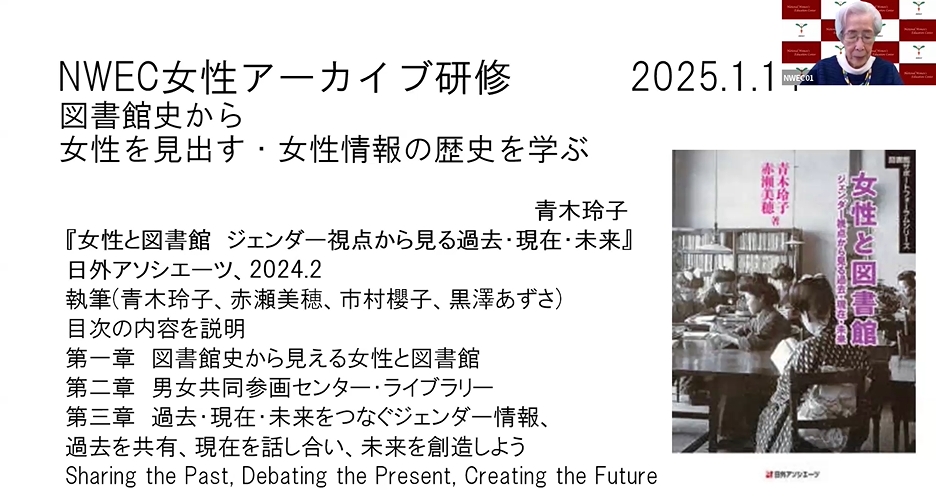
In addition, a lawyer spoke about copyrights in relation to copying, photographing, publishing digital data, and performing other tasks related to archived materials, including the latest trends. The Tohoku University Archives and Society for Research on Local Women's History also reported the following activities.
The Tohoku University Archives held "A Century of History Starting with KURODA Chika, Japan's First Female University Student" in 2023 as a special exhibition commemorating the 110th anniversary of the admission of Japan's first female university students. In the same year, the archives made public the "KURODA Chika Materials," one of Japan's most extensive collections of information materials about Japan's first female university student.
The Society for Research on Local Women's History, which was established in March 2024, is a nationwide research association comprising individual members specializing in research on local women's history. To commemorate its 10th anniversary, the society carried out two activities: 1) issuing a bulletin collection entitled "Bulletin of the Society for Research on Local Women's History: Living and Exceeding Where We Are Now" and 2) publishing "The Constitution of Japan and I" and "Women's History and I" in the "10th Anniversary Feature: Voices of Members" section of "Research on Local Women's History" Vol. 4, in addition to research articles and notes.
Women’s Archives Center Exhibition
Special Exhibition "The History of Childbirth"
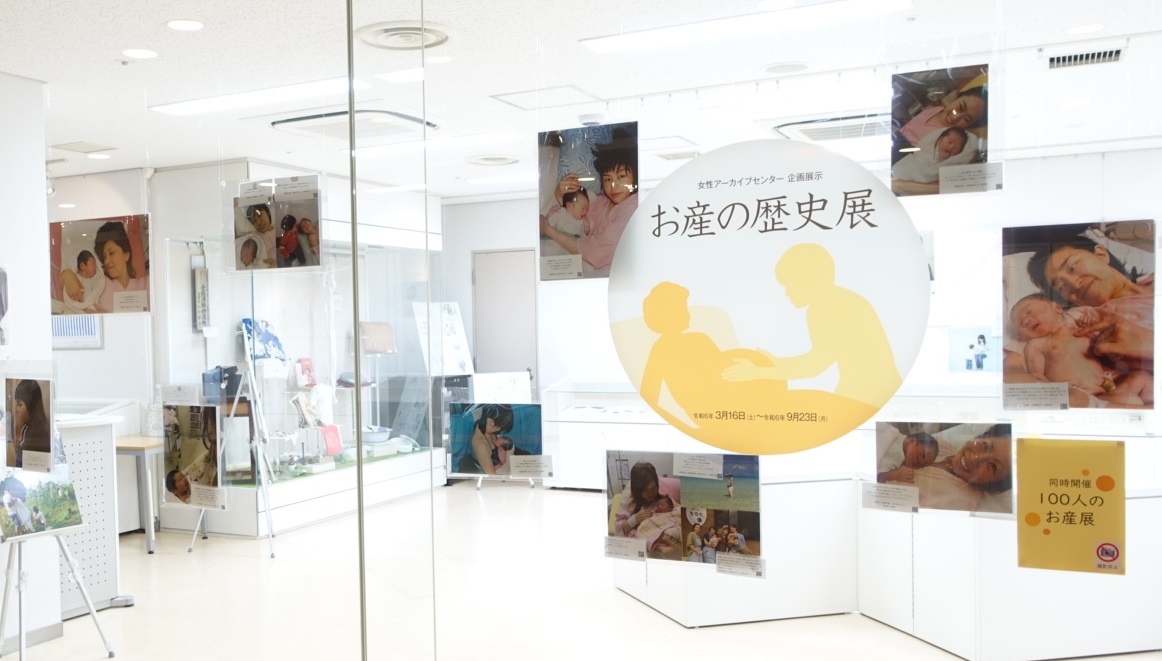
This exhibition was held from March to September 2024. Japan established a medical system and regulations on midwives to provide a better childbirth environment in the Meiji period, adopted a population policy to increase its fertility rate during World War II in the Showa period, underwent a baby boom after the war, and saw a drop in its birth rate as the result of the spread of the family planning movement in the 1950s, when the place of childbirth rapidly shifted from homes to hospitals. After that, there were also increases in "natural childbirth," which avoids relying on modern medicine, and the attendance of husbands and other family members at children's births. The purpose of this exhibition was to guide people through the above history with relevant records and provide them with an opportunity to learn about the many different types of childbirth today and to think about the realization of a society that ensures women can give birth safely and securely by viewing the concurrent "Childbirth of 100 People" photo exhibition, organized by the Childbirth of 100 People Project to introduce today's childbirth landscape.
The exhibition also included materials collected by the Research Group on the History of Midwives as part of the KAKENHI Grants-in-Aid for Scientific Research project (FY2021–FY2023) "A Historical Sociological Study of Midwifery Based on Digitized Historical Records about Midwives and Childbirth Records in Japan." The catalogue of materials collected by the society and digital images of some of them were made available in the Women's Digital Archives System in March 2024 under the title "Archive Group 42: Collection of the Society for Research on the History of Midwives."
Collection Exhibition “The 50th Anniversary of the International Women's Year”
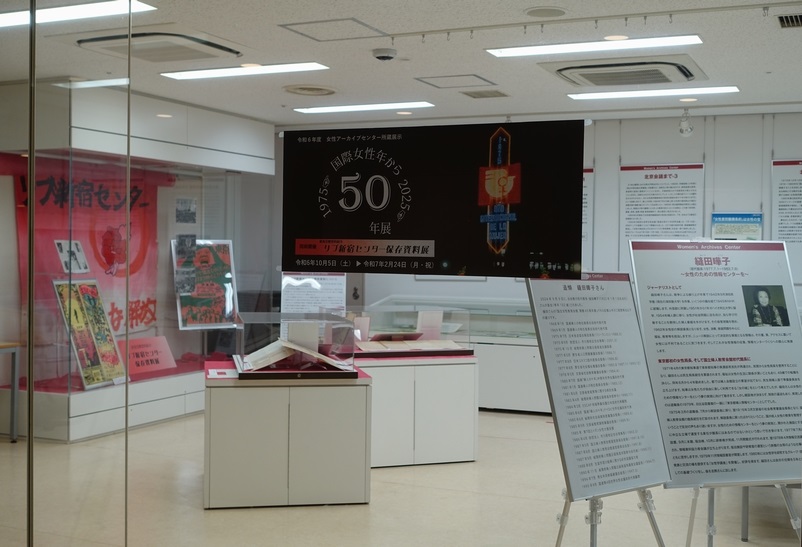
This exhibition was held from October 2024 through March 2025. The year 2025 marked the 50th anniversary of the International Women's Year (1975), which was designated by the United Nations with the aim of promoting women's empowerment. In 1975, the World Conference on Women, the first of its kind, was held. The conference adopted a World Action Plan and designated the period from 1976 through 1985 as the United Nations Decade for Women, during which time member countries carried out their own initiatives. Japan adopted its National Action Plan in January 1977 and opened the National Women's Education Center that same year. The United Nations adopted the Convention on the Elimination of All Forms of Discrimination against Women in 1979. Japan, which sought to enhance its legal framework—for example, through the revision of the Nationality Act, the establishment of the Equal Employment Opportunity Act, and provision of gender-neutral home economics education—also ratified the convention in 1985.
The Fourth World Conference on Women, held in Beijing in 1995, adopted the Beijing Declaration and Platform for Action. Although Japan established the Basic Act for Gender Equal Society in 1999, the country's gender disparities in politics and economics have not narrowed, resulting in the country's continuing low ranking in the World Economic Forum's Global Gender Gap Index.
As today many problems remain to be resolved despite advances in women's empowerment, this exhibition looked back on the past 50 years using materials stored in the Women's Archives Center to encourage visitors to think about solutions to issues faced in promoting gender equality.
The Lib Shinjuku Center Preserved Materials Exhibition displayed newly donated materials and was held concurrently in order to coincide with the aforementioned exhibition. It showcased materials owned by the Center, which since the 1970s, when the Women's Liberation Movement gained momentum in Japan as well, had addressed issues of domestic violence by husbands, contraception, abortion, pregnancy, menstruation, and other topics that remain relevant today.
Collaboration with Other Organizations
Women's Life Support Training
The Japan NPO Center, a non-profit corporation, and the Little Women Project (Wakakusa Project), a general incorporated association, conducted the "Survey on the Activities of Organizations Engaged in Provision of Support for Women Who Have Difficulty with Life" in FY2022 which NWEC provided support as a cooperating organization. This questionnaire survey collected responses from 228 groups supporting women living with difficulty due to poverty, violence, domestic violence, bullying, unintended pregnancy, and so forth to grasp what kind of people these organizations supported, entities and specialists with which they worked in partnership, the challenges they faced in terms of their organizational foundations and operations, and other aspects. The results revealed that many groups provided a wide range of support, and more than half found it challenging to secure human resources and to diversify their sources of income.
Building upon the result of this survey, since FY2023, NWEC has been co-hosting training programs implemented by the Japan NPO Center and the Little Women Project. These training programs aim to strengthen partnerships among support groups, administrative authorities, and specialists, and among various support groups, with special emphasis on the exchange of opinions and networking between public- and private- sector stakeholders including the local level women and gender equality centers.
Column: On the Act on Support for Women Facing Difficulties
The Act on Support for Women Facing Difficulties came into force on April 1, 2024. The challenges facing women have become increasingly complicated, diverse, and complex, including economic poverty, sexual violence and crime, and broken family relationships. Now that COVID-19 has caused these issues to rise to the fore, it is an urgent task to offer new types of generous support to women—for example, from the perspective of “measures against loneliness and isolation.” Traditionally, the Anti-Prostitution Act, the primary purpose of which is to protect and rehabilitate women at risk of becoming involved in prostitution, has provided a legal basis for the provision of support to women facing difficulties. That act, however, cannot accommodate the diverse difficulties facing today’s women. This is why the above new law was established and put into force. The new law clearly stipulates the perspectives of “women’s welfare,” “respect for and protection of human rights” and “gender equality” as well as promotes the provision of support through cooperation among the national government, local governments, and private-sector organizations.
Participation in the NPTech Initiative
In its Women's Digital Human Resource Development Plan, the Japanese government has set the target of accelerating the development of female digital human resources who have digital skills that lead directly to employment, with the aim of improving women's employment and income. NWEC is expected to work in partnership with gender equality centers and companies in various parts of Japan to develop and implement women's digital human resource development programs.
As the first step in this endeavor, NWEC is participating in the NPTech Initiative, which is hosted by the Japan NPO Center, a non-profit corporation.
NPTech stands for "NonProfit Technology," which refers to information technology that supports the activities of non-profit organizations. In this project, participating IT companies—including NTT DATA Group Corporation, Dell Technologies Japan Inc., ITOCHU Techno-Solutions Corporation, Intel Corporation, and TIS Inc.—provide instructors for the training programs. The purpose is to offer information technology-related training programs to non-profit organizations.
In FY2024, the NPTech Initiative implemented a program named "Digital One-day Study Abroad" in which participants took part in the Dell Technologies Forum under the guidance of employees of Dell Technologies Japan Inc., in addition to a total of five seminars with themes such as IT Literacy, Security, System Development, and AI.
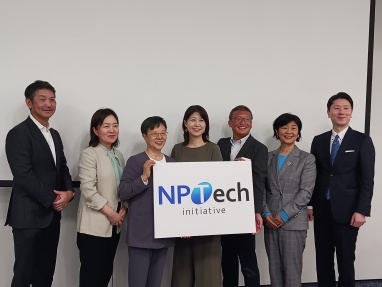 Photo session for the host organization and participating companies (third from left: HAGIWARA Natsuko, President of NWEC)
Photo session for the host organization and participating companies (third from left: HAGIWARA Natsuko, President of NWEC)
Promoting the "Coaching Guide for Girls"
The Laureus Sport for Good Foundation released the Coaching Guide for Girls in October 2024. This guide outlines seven kinds of "knowledge" that coaches should possess and what kind of "awareness" is important for coaching based on such knowledge, so that children, including girls, can safely and securely participate in sports, thereby obtaining all the kinds of benefits sports provide. A checklist is also included for coaches to apply their "knowledge" and "awareness" as well as ideas for exercise sessions that coaches can use immediately. NWEC agrees with the purpose of this guide and has been cooperating in promoting it.
Online distribution
・NWEC CHANNEL(You Tube)

